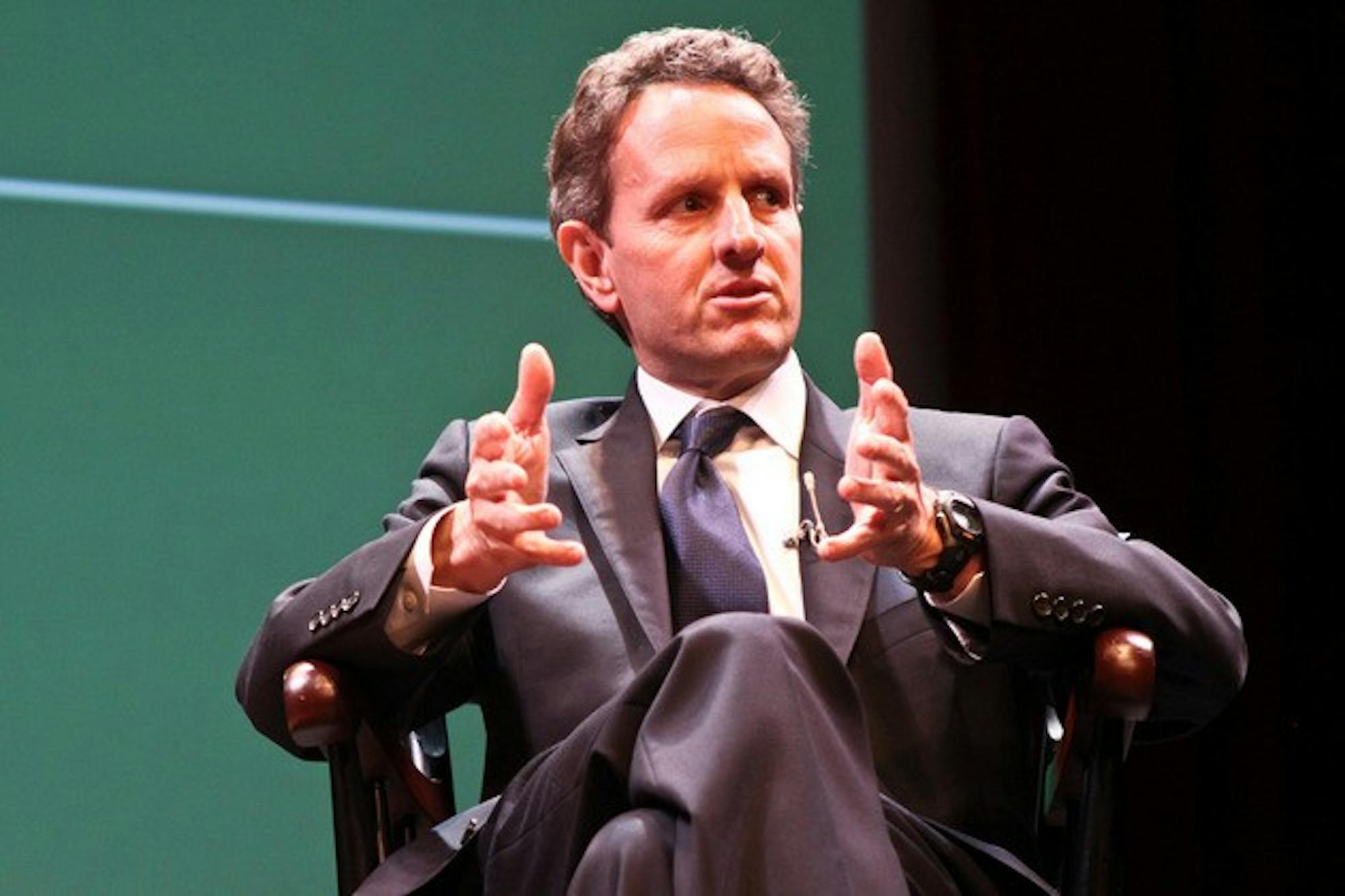Geithner pulled in $100,000 this spring for his appearances at the annual meetings of private equity firms Blackstone and Warburg Pincus. He earned $200,000 for speaking at a Deutsche Bank conference in June, which he attended alongside former French president Nicolas Sarkozy and former Italian prime minister Mario Monti, CNBC reported. Geithner books his engagements through the Harry Walker Agency, whose clients include former president Bill Clinton and former vice president Dick Cheney.
The fees place him alongside Clinton and former British Prime Minister Tony Blair as speakers who have garnered millions of dollars after stepping down from public service jobs.
After leaving office, Geithner accepted a fellowship position at the Council on Foreign Relations. The think tank's website has not been updated with any recent activity since a speaking engagement scheduled for last June.
Geithner visited seven universities in March to give seminars on the financial crisis, including Harvard University, Massachusetts Institute of Technology, Northwestern University, Princeton University, the University of Michigan, Yale University and the University of Chicago, a representative for Geithner said. He plans to visit more universities in the fall.
He has also joined the board of the International Rescue Committee and returned to the membership of The Group of 30, an organization that focuses on economic issues where he was previously a member from 2006 to 2009.
Geithner, who is working on a book about the financial crisis, hired lawyer Robert Barnett to arrange a contract with Crown Publishing Group, a division of Random House. Barnett previously organized an $8 million book deal for Hillary Clinton in 2000 and a $10 million deal for her husband the following year, The New York Times reported.
Sunlight Foundation senior fellow Lee Drutman, who studies the "revolving door" phenomenon of public officials moving on to related careers in the private sector and vice versa, said a $100,000 appearance for someone of Geithner's stature is not surprising. He called the speaker circuit "kind of a ridiculous business."
"I doubt Geithner's giving away any insider information at meetings like this," he said. "It's mostly just about making people feel important."
The revolving door questions whether lawmakers and bureaucrats use their time in office to position themselves for a payout in the private sector.
Drutman said that a long-term public sector employee like Geithner is likely motivated by working for the public good, having had ample opportunities to "cash in."
"He could have made 10 or 20 times what he was making with the federal government by switching to Wall Street, so clearly that is not his largest concern," Drutman said.
Economics and public policy professor Charles Wheelan said he is less concerned by former legislators and bureaucrats who profit from speaking engagements and book deals than the trend of public officials becoming lobbyists.
"In general, I'm sympathetic to folks like Geithner making money in a short period of time after leaving government office," Wheelan said. "He's been grossly underpaid for so long. He could have easily made $10 million a year in a mid-level position somewhere like Goldman."
Wheelan said he doubted that Geithner was being paid high appearance fees for divulging inside information about the state of the economy.
"I really think it's a prestige thing for these firms and a signal to their clients that they have the kind of clout to get Geithner to speak at their events," Wheelan said.
Current laws forbid former members of Congress from lobbying in the first year or two after they leave office, but there are no restrictions on public officials returning to other sectors of private business.
Bureaucrats frequently take private sector jobs that overlap with companies they previously regulated.
While not considered to be corruption, the interchange between public and private sector employees can degrade the public's trust in the legislative process, said Dan Auble, a researcher at the Center for Responsive Politics.
Large public appearance fees like Geithner's can call into question the motivation for public service, he said.
"People who work with him will have access to his Rolodex," Auble said. "He still has all his contacts in the White House."
A list of the highest-paid speakers compiled by MSN in 2011 included former Treasury Secretary Lawrence Summers, former Vice President Al Gore, former Federal Reserve chairman Alan Greenspan, former New York City mayor Rudolph Giuliani, Blair, Bill Clinton, former president Ronald Reagan and Donald Trump.
Two of Geithner's mentors, Summers and Robert Rubin, also garnered lucrative appearance fees and book deals after leaving the Treasury.
Rubin, who served as Treasury Secretary from 1995 to 1999, accepted a position on the Citigroup Board of Directors after stepping down from his government post. He earned $115 million, excluding stock options, during his decade on the board, according to The Wall Street Journal. Rubin previously worked at Goldman Sachs for 26 years and served as a co-chairman.
Summers became president of Harvard in 2001, after two years as Treasury secretary. Forced to resign from the university presidency in 2006, he continued to teach there and took on an advisory role for the hedge fund D.E. Shaw.
When President Barack Obama chose Summers to direct the National Economic Council in 2009, Summers' disclosure statements for the year revealed more than $5 million in income from his position at the hedge fund and $2.7 million in speaking fees, the New York Times reported.
Geithner, who majored in government and Asian studies at Dartmouth, received a master's degree in international economics and East Asian studies from Johns Hopkins University.
He worked three years at Kissinger Associates, an international consulting firm, before joining the Treasury in 1988. He was promoted to Under Secretary of the Treasury for Internal Affairs in 1999 and became director of the International Monetary Fund's policy development and review department in 2001.
He then served six years as president and chief executive officer at the Federal Reserve of New York. Obama appointed him Treasury Secretary in 2009.




